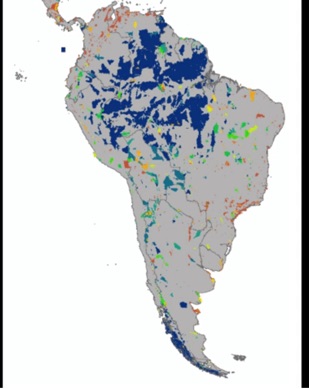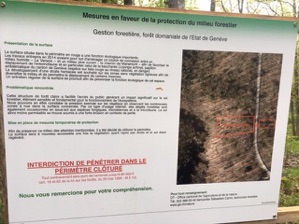
Misuse of right of public access
At present national law protects private property in nature areas, which probably constitutes one of the last viable resorts in nature protection. Right of access to nature areas, whether private or public, adopted initially by some countries as part of general public rights, presents nowadays a serious threat to natural ecosystems and is quite ofter abused. The dangers of invasion of natural areas and wildlife habitats has been highlighted by the recent pandemic.
Discussion: Draft law on access to mountains
Unrestricted right of public access to nature areas, including areas in private property and, in particular, to mountain regions, adopted by some countries in Europe, is commonly known as “everyman’s right” or “freedom to roam”. Recent developments on global level, such as rapid human population growth, exponential expansion of global consumption industry, especially of consumption of recreation, nature and wildlife tourism and other “nature” market products, often lead to irresponsible misuse of this right and thus present hight risk and important pressure for wilderness areas, their ecosystems and wildlife.
Only a limited number of countries provide unrestricted access to protected nature areas, recreational use of and collection of natural products in these areas. Conditions, limitations and responsible approach to the “right to roam” are difficult, if not impossible, to enforce. It is being challenged at present for the above reasons, especially for mountain regions, in particular vulnerable to anthropogenic stress and to climate change, which is more evident in the mountains than in valleys and puts active pressure on nature and hydrology.
The right of unrestricted access adds to the steadily increasing pressure
on protected areas worldwide. Countries allowing open access to all types
of nature areas experience more pressure on their protected areas,
the mountains being the first affected.
Increased pressure on national local parks
National parks, nature reserves, and wilderness areas improve
the well-being of people living nearby. People living along the edges
can alter the functioning of ecosystems at the core of the protected area,
putting biodiversity at risk .pdf
Faroe Islands closed for repair after degradation by tourists.
National parks in the US: How tourists are loving nature to death.
By massively invading the home of wild animals we are pushing the
What was not a problem 20-30 years ago is one now.
Damage to nature is usually done by occasional consumption-oriented
visitors. Goods (and nature has become a commercial item) are now seldom used where they are produced. A couple of examples of mountainous countries facing real and recent problems with irresponsible access to nature areas:
Switzerland, Alps and Jura mountains:
There is an understanding that human pressure is much more damaging than climate change -
La biodiversité en danger en Suisse: "une crise plus grave que celle du réchauffement climatique"
and the “in terms of biodiversity, "democracy does not allow radical changes". Research in social sciences is addressing a the issue of challenges and fears related to tourism in the mountains on State level.
The Swiss National Park (the oldest in Europe) does not allow visitors and was created to protect the integrity of nature from any human presence.
Regional Nature Parks, responding to increasing occupation of their mountain territory for recreation and sport, are developing campaigns such as “respect is to protect” (for winter sports in nature areas of the mountains) and are reviewing their charters questioning the principle of universal accessibility and establishing no-go zones, like in the park of the park of the Pays d’Enhaut. All the tourist offices and mountain guides sign a voluntary commitment charter.
Winter sports and trekking are in particular harmful to wildlife who is trying to survive winter in a saving mode -
Wildlife disturbance and winter recreational activities.pdf
Danger du tourisme d'hiver.pdf
Searching for antlers in forests of the Alps after a difficult winter
kills many animals by disturbance and harassment, as well as
recreation activities like skiing. Antlers are then sold to Asian countries.
Almost everywhere in Switzerland zones of tranquility to protect wild
animals are developing. Rangers can amend skiers who disturb animals.
Area closed for access in a forest in the Alps for protection of
forest environment → → →
To face the increasing devastating pressure on the nature of the mountains Switzerland, in cooperation with other Alpine countries, is developing a special branch of law - the Law of the Mountains , dedicated to the needs and peculiarities of the mountains, with aim of land conservation and nature protection, in order to find an equilibrium between development and conservation of the mountains’ fragile nature.
Finland
Public access rights, or so-called “everyman's rights”, refer to the right of everyone in Finland to enjoy outdoor pursuits regardless of who owns or occupies an area.
Berry picking, developed on this basis, by massive number of foreign workers, either in State or private forests, profit mainly to foreign companies, and constitute a serious pressure on the habitat of native wildlife. Not mentioning the issue of human rights of the overexploited workers.
In a globalised world the “right to roam” has a significant potential for abuse by foreign business, not benefiting local communities for whom this right was initially secured, as this right applies to everyone.
Norway
Stronger restrictions on cruise ships and better protection for polar bears are among the new tourism measures proposed for Svalbard.
Mountain glaciers suffer greatly from tourism, an example is Iceland .
We shall not forget that access to glaciers is done quite often to assess hydric resources (the new gold) for exploitation and export, in particular in a legal environment where water rights are a private commodity.
Vast majority of Europe's key habitats in poor or bad condition – report.
Why can't we leave them alone? The troubling truth about selfies with sloths.

Pressure on protected areas,
WCS
Study shows one third of world's protected areas degraded by human activities , contributing to unprecedented loss of biodiversity

